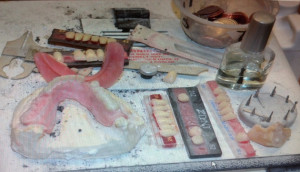65% of dentists are wrong about their dental lab…are you one of them?
Police in Springfield, OH, responded to a call about a man who had been shooting a gun repeatedly. After apprehending the man, they searched his home and made an unlikely discovery in the basement: what looked to be an illegal dental laboratory. Only, it wasn’t illegal at all. It belonged to his brother, a dental laboratory technician who learned the trade during a one-year course in prison. In Ohio, and in most states, dental labs are unregulated, meaning anyone can open and operate a dental laboratory. The training that the basement technician received is more than what is legally required in over 40 states.

Courtesy of Police Department of Springfield, Ohio
“In a 2009 American Dental Association member survey, nearly 65% of dentists responded that they believe dental technicians and laboratories are regulated in their state. This is not the case. In fact, only four states in the U.S. require either certification or continuing education,” the Dental Tribune reported. Given how stringently dental offices are run, it’s remarkable that dental laboratories have flown under the radar for so long.
The lack of oversight of domestic labs may contribute to another worrisome trend. An unknown number of U.S. dental laboratories outsource their work to foreign factories, oftentimes without dentists knowing it. Outsourcing is estimated “conservatively at 20%” according to the National Association of Dental Laboratories (NADL). Concern arises over the quality of materials used. One report found high levels of lead in outsourced dental work.

Courtesy of Police Department of Springfield, Ohio
Many assume that as long the work coming back from the lab is sanitized, patients and dentists have nothing to worry about. But problems may lie in what can’t be seen. In the same report, a woman hired a lawyer to sue her dentist after receiving a dental bridge that contained lead that gave her “significant complications and reactions and infection that stemmed from the restoration.” Additionally, dentures may be inadequately polymerized, making them less biocompatible and more prone to causing adverse effects. The unfortunate fact is that it’s not easy for dentists to ascertain the quality and safety of dental work regardless of where it came from. This underscores the importance of knowing that your lab is doing things right.
Last year, NADL launched “What’s in your mouth,” a campaign to educate dentists, labs, and patients about the possible perils of the unregulated dental lab industry. Regulation or no, it is in the best interest of the dentist to do some due diligence and make sure the dental work they receive is up to snuff. Patient health, and the dentist’s reputation, is at stake.
Tips for finding a good dental lab
- Develop a relationship with your laboratory and ask hard questions if need be.
- Consider paying your dental lab a visit in person.
- There are labs that employ Certified Dental Technicians (CDTs), which may remove some of the guesswork about quality and standards.
- Some labs are certified. According to NADL, choosing a “Certified Dental Laboratory (CDLs) provides assurance that a laboratory has met specific standards relating to quality assurance, safety, and business and manufacturing practices.” NADL maintains an online directory of Certified Dental Laboratories at http://dentallabs.org/cdl-directory/.
Trending now- Dear Team: An Open Letter from Your Hygienist



Pingback: What to do about crazy patient complaints | Remin Media()